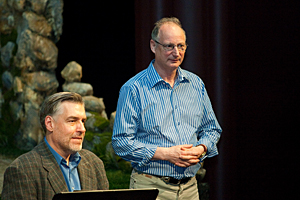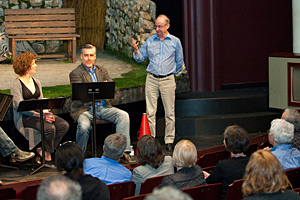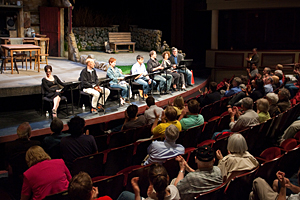ADVERTISEMENT
- Rozovsky wins prestigious NSF Early Career Award
- UD students meet alumni, experience 'closing bell' at NYSE
- Newark Police seek assistance in identifying suspects in robbery
- Rivlin says bipartisan budget action, stronger budget rules key to reversing debt
- Stink bugs shouldn't pose problem until late summer
- Gao to honor Placido Domingo in Washington performance
- Adopt-A-Highway project keeps Lewes road clean
- WVUD's Radiothon fundraiser runs April 1-10
- W.D. Snodgrass Symposium to honor Pulitzer winner
- New guide helps cancer patients manage symptoms
- UD in the News, March 25, 2011
- For the Record, March 25, 2011
- Public opinion expert discusses world views of U.S. in Global Agenda series
- Congressional delegation, dean laud Center for Community Research and Service program
- Center for Political Communication sets symposium on politics, entertainment
- Students work to raise funds, awareness of domestic violence
- Equestrian team wins regional championship in Western riding
- Markell, Harker stress importance of agriculture to Delaware's economy
- Carol A. Ammon MBA Case Competition winners announced
- Prof presents blood-clotting studies at Gordon Research Conference
- Sexual Assault Awareness Month events, programs announced
- Stay connected with Sea Grant, CEOE e-newsletter
- A message to UD regarding the tragedy in Japan
- More News >>
- March 31-May 14: REP stages Neil Simon's 'The Good Doctor'
- April 2: Newark plans annual 'wine and dine'
- April 5: Expert perspective on U.S. health care
- April 5: Comedian Ace Guillen to visit Scrounge
- April 6, May 4: School of Nursing sponsors research lecture series
- April 6-May 4: Confucius Institute presents Chinese Film Series on Wednesdays
- April 6: IPCC's Pachauri to discuss sustainable development in DENIN Dialogue Series
- April 7: 'WVUDstock' radiothon concert announced
- April 8: English Language Institute presents 'Arts in Translation'
- April 9: Green and Healthy Living Expo planned at The Bob
- April 9: Center for Political Communication to host Onion editor
- April 10: Alumni Easter Egg-stravaganza planned
- April 11: CDS session to focus on visual assistive technologies
- April 12: T.J. Stiles to speak at UDLA annual dinner
- April 15, 16: Annual UD push lawnmower tune-up scheduled
- April 15, 16: Master Players series presents iMusic 4, China Magpie
- April 15, 16: Delaware Symphony, UD chorus to perform Mahler work
- April 18: Former NFL Coach Bill Cowher featured in UD Speaks
- April 21-24: Sesame Street Live brings Elmo and friends to The Bob
- April 30: Save the date for Ag Day 2011 at UD
- April 30: Symposium to consider 'Frontiers at the Chemistry-Biology Interface'
- April 30-May 1: Relay for Life set at Delaware Field House
- May 4: Delaware Membrane Protein Symposium announced
- May 5: Northwestern University's Leon Keer to deliver Kerr lecture
- May 7: Women's volleyball team to host second annual Spring Fling
- Through May 3: SPPA announces speakers for 10th annual lecture series
- Through May 4: Global Agenda sees U.S. through others' eyes; World Bank president to speak
- Through May 4: 'Research on Race, Ethnicity, Culture' topic of series
- Through May 9: Black American Studies announces lecture series
- Through May 11: 'Challenges in Jewish Culture' lecture series announced
- Through May 11: Area Studies research featured in speaker series
- Through June 5: 'Andy Warhol: Behind the Camera' on view in Old College Gallery
- Through July 15: 'Bodyscapes' on view at Mechanical Hall Gallery
- More What's Happening >>
- UD calendar >>
- Middle States evaluation team on campus April 5
- Phipps named HR Liaison of the Quarter
- Senior wins iPad for participating in assessment study
- April 19: Procurement Services schedules information sessions
- UD Bookstore announces spring break hours
- HealthyU Wellness Program encourages employees to 'Step into Spring'
- April 8-29: Faculty roundtable series considers student engagement
- GRE is changing; learn more at April 15 info session
- April 30: UD Evening with Blue Rocks set for employees
- Morris Library to be open 24/7 during final exams
- More Campus FYI >>
8:20 a.m., May 7, 2010----While Irish author Bill Roche enjoyed co-writing the script for The Eclipse with the film's director Conor McPherson, the creator of the Wexford Trilogy said he doesn't envision a long-term career on the silver screen.
During a question and answer session that followed a screening of The Eclipse in the Trabant University Center Theatre at the University of Delaware on Sunday, May 2, Roche fielded questions about his work on the script and his appearance in the film.
The author's week-long visit to UD also included visits to classes in English, theatre and the Master of Liberal Studies Program, as well as readings of a new Roche script by the University's REP actors on Wednesday, May 5, in the Thompson Theatre of the Roselle Center for the Arts.
The author of seven plays, two film scripts, and a collection of short stories, Roche also wrote Tales from Rainwater Pond (Pillar Press, Kilkenny, 2006), which includes “Table Manners,” a story that evolved into the screenplay for The Eclipse.
Recently named Best Irish Film of the year, The Eclipse also garnered Roach and McPherson a separate award for best script.
Framed by elements of the supernatural, the film zooms in on the terse relationships between novelists Lena Morelle, (Iben Hjejle), and Nicholas Holden (Aidan Quinn) who are attending a literary festival in the Irish harbor town of Cobh, in County Cork, and Michael Farr (Ciaran Hinds), a festival volunteer haunted by visions of his still-living father-in-law and his dead wife.
“The original story, 'Table Manners,' is part of a collection of short stories that became Rainwater Pond,” Roche said. “I sent the story to various people, including Conor McPherson, who fell in love with story and though it would make a pretty good film.”
Roche said that he and McPherson spent a lot of time working on the film script, which called for a title change, as well as a change in marital status for the character of Michael Farr.
“In my original story, Michael is still married to his wife, and was fooling around. When we were trying to sell the story to the movie producers, we found that there really was not much sympathy for a married man fooling around with other women,” Roche said. “Somebody suggested that making Michael a widower would generate all the sympathy in the world, and that's what happened.”
The change to film's title came about because the producers said there was another play called Table Manners by Alan Ayckbourn, Roche noted.
“I threw my hands up in the air, and we changed the name to The Eclipse,” Roche said. “We later found out that there were a lot of things called The Eclipse, including a book by John Branville, one of my favorite writers.”
Roche noted that the supernatural element, which includes Michael's being haunted by his elderly father-in-law, as well as by his dead wife, are more in realm of the film's director and reflect the ancient Irish tradition of the banshee.
“In Ireland, there is this thing called a banshee, represented by an old woman who would appear at the time of somebody's death,” Roche said. “In those more primitive days, we did not have phones or email to communicate. When the banshee came with their terrible sound, it was a way to let people know that something had happened, and that bad news was on the way.”
Roche said that while he pitched the idea of shooting the film in his hometown of Wexford, the director chose the town of Cobh, in County Cork, with its tiered layout and visual images that included ancient arches and viaducts.
“I wanted it in my home town of Wexford, because that is where my stories are set, but the director fell in love with the many levels of Cobh,” Roche said. “I know he was fascinated with the movie The Exorcist, and about going up to heaven and coming back down the walls and all that jazz. If you watch The Eclipse again, you will see that things and people are constantly going up and coming down. We just didn't have that element in Wexford.”
When asked if he was unhappy with changes made to his original story, Roche noted that he was just glad that somebody like Conor McPherson wanted to use it for a movie.
“You work on a collection of short stories for seven years, and then find nobody really wants them,” Roche said. “You are very glad when somebody will take them. I love Conor, and I just knew he would take care of it.”
Roche noted that complementing the film's visual effects is the score written by Fionnuala Ni Chiosan, an artist and the wife of McPherson.
“I was a musician before I was a writer, so music is very important to me,” he said. “When I am thinking about finding a person to direct a play I've written, I have to be happy with the music that they are going to use. It just wouldn't work without that.”
While he appeared as the head of the literary festival in The Eclipse, Roche said he has no plans to pursue acting as a full time occupation. “I enjoyed being in the move as Jim Belton, because as the head of the literary festival he is running the show. For me to play that part is almost Hictchcockian.”
As a youth growing up in Wexford, Roche noted there were three cinemas, and that he would often get a chance to see up to eight moves in a week's time.
“I was raised on cinema, American cinema, and I especially like the movies of John Ford,” Roche said. “My favorite movie would probably be The Searchers. I also really like The Sweet Smell of Success and Cool Hand Luke. All those guys like Brando, McQueen and James Dean really had a big influence on me.”
Roche noted that his writing usually begins with a special moment or feeling, and that he knows fairly soon how the story will begin and end.
“I like to know the beginning and the end, and I usually stick to whatever I have in mind in that regard,” Roche said. “It's the middle distance that cause me most of the trouble. The middle is really a complete mystery to me. I just have to manage those miles to get to the end of the story.”
When asked if he ever comes across a character that seems to resist his plans for the work, Roche noted that in the end, these situations work themselves out buy by authorial imperative.
“They will go there. In the end, a writer is kind of like God, in that he is looking down on the characters,” Roche said. “That's destiny. The characters may not like my decisions, but they will end up where I want them to go.”
Like most of the characters in the movie, Roche noted that his literary characters are likely to evoke a mixture of laughter and tears. “Writers exclude humor at their peril,” Roche said. “Laughter and tears coexist with me. I lean closer to tears. Tears will always beat the hell out of laughter.”
Roche's visit was co-sponsored by the Department of English, the Institute for Global Studies and the Faculty Senate Committee on Cultural Activities and Public Events.
Article by Jerry Rhodes
Photos by Kevin Quinlan





